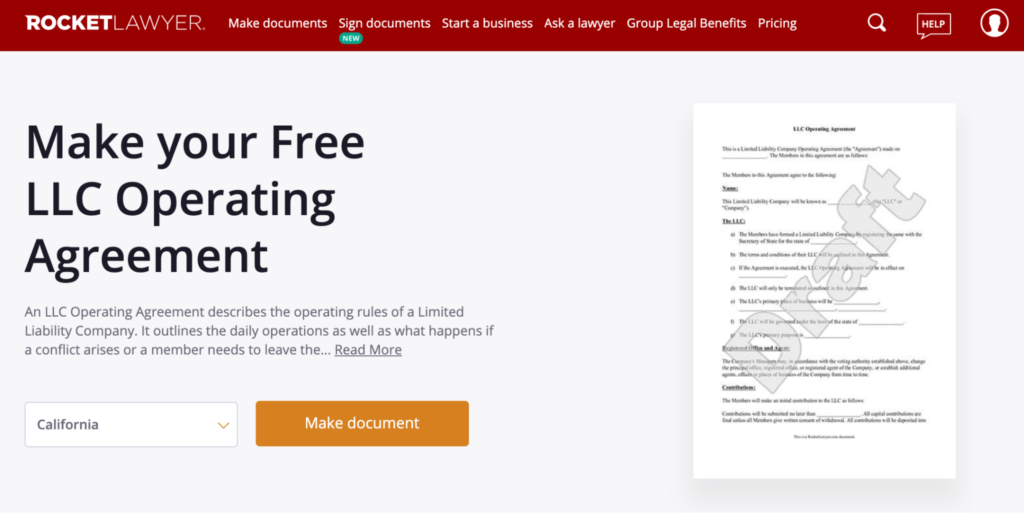Disclosure: This content is reader-supported, which means if you click on some of our links that we may earn a commission.
Choosing a management structure is a crucial part of the LLC formation process. You’ll have the option to form a member-managed LLC or a manager-managed LLC.
This in-depth guide will explain the key differences between members and managers in an LLC, allowing you to make an informed decision on your LLC management structure.
Why Understanding Members and Managers in an LLC Is So Important
A limited liability company (LLC) is a legal business entity formed with the state. The LLC business structure relieves owners from the company’s debts and liabilities. If you’re starting a new business, the LLC structure is one of the most popular options nationwide for businesses in every industry.
When you’re going through the LLC formation process and filing paperwork with your state, you’ll need to designate a management structure for the company. This decision will have a significant impact on the way your business runs on a day-to-day basis.
So what’s the difference between a manager in LLC? Why does it matter? Let’s start with the basics:
- LLC Members — The owners of an LLC are called “members.” Most states don’t restrict ownership, so members could be individuals, corporations, other LLCs, foreign entities, or a combination of these. There is no limit on how many members can be in an LLC, and the ownership percentage can vary from member to member.
- LLC Managers — An LLC manager could be an individual, group, or business entity. Managers are responsible for running the day-to-day operations of the business. Managers may be members, or they might not have any ownership stake in the LLC.
If you’re starting a member-managed LLC, the members (owners) have full control over the operations.
In most states, a member-managed LLC is the default option, meaning this will be your management structure if you fail to designate another choice. It’s common for LLC members to want a member-managed structure, so they keep control over the business and decisions.
With a manager-managed LLC, one or more of the owners is essentially a passive investor. This means they offer contributions to the business and make a profit based on their ownership share, but they don’t have the authority to make decisions for the business or handle day-to-day operations.
Managers in an LLC generally have the authority to do the following on behalf of the business:
- Open, close, and manage business bank accounts
- Obtain a loan for the business
- Hire and fire employees
- Sign legally binding documents on behalf of the company
- Initiate business agreements with vendors and third parties
- Buy or sell real estate, vehicles, equipment, and other business assets
That’s why it’s so important to choose the right LLC management structure from the beginning. Whoever you designate in a management role can ultimately make some of the most important decisions for your business.
There are obviously pros and cons to both structures, each with its own “dream” scenario for the LLC owners.
The dream for an owner in a member-managed LLC is control. You’ll have full authority to make big-picture decisions as well as minor day-to-day operations decisions. From hiring to purchase orders, choosing software, changing store hours, and more, you can control every aspect of the business.
But not every LLC owner wants to be bothered with employees, customers, or any decision-making at all. The dream scenario for a member in a manager-managed LLC is to simply sit back and collect profits. You’ll have no other hassles or duties beyond seeing a return on your investment.
Here’s an excellent story that showcases the importance of choosing between a member-managed and manager-managed LLC.
Steven Sinatra is the co-owner of World Pawn Shop. He owns the business with his father, and the two business partners decided to form a member-managed LLC because of the knowledge and experience they bring to the table.
Sinatra explains that it would be tough to replace himself or his father in the pawnshop business. As a pawnbroker, there are so many things you must learn and know to be successful. It takes employees years to figure things out.
They opted for a member-managed LLC because they can run the business exactly how they want to and instantly fix problems on their own terms. A manager wouldn’t be helpful.
Quick Tips for Choosing the Management Structure of Your LLC (Member-Managed vs. Manager-Managed)
The following tips and best practices will help you decide whether or not a member-managed LLC or a manager-managed LLC is right for your business. This will also help you formalize the management structure of your LLC.
Tip #1 — Document Your Decision
As previously mentioned, member-managed is the default management structure for LLCs in most states. But even if you’re not formally required to document your choice, you should keep a clear record of everything.
This starts with your articles of organization—part of the initial paperwork filed with your state during the formation process.
You should also have a written LLC operating agreement that clearly defines the management structure, rights and responsibilities of members, rights and responsibilities of managers, and more. This can include things like additional capital contribution requirements, voting rights, buy-out provisions, and other crucial activities related to management and operations.
Using an online legal service like Rocket Lawyer to create your operating agreement makes this process much easier.

The simple template works for both member-managed and manager-managed LLCs alike. You just need to answer some questions, and Rocket Lawyer will essentially create the document for you. You’ll document things like:
- LLC name and address
- LLC formation date
- Registered agent information
- Member names and contact information
- Member contributions (capital contributions, assets, property, etc.)
- Member rights and responsibilities
- Manager details (if applicable)
- Accounting procedures
- Voting procedures
- How and when the LLC will be dissolved
- Procedures for if/when a member quits or dies
Another advantage of using Rocket Lawyer to create this document is that you can securely sign it online and share it with others to do the same. So all of the members and managers don’t need to be in the same room to formalize this legally binding document.
Beyond the operating agreement, Rocket Lawyer also offers LLC formation services. So you can spend less time doing paperwork and just let Rocket Lawyer handle all of the filings on your behalf.
The premium Rocket Lawyer membership costs just $39.99 per month, and you can try it for free with a seven-day trial.
Tip #2 — Assess Your Availability and Willingness to Work
Most people who start a business want to be actively involved with running it.
A sole proprietor might ultimately turn their part-time side-hustle into a full-time business and start an LLC to make things official. Or maybe two friends or business partners want to start a new venture together.
Regardless of the scenario, LLCs are a great option because they offer so much flexibility. This includes flexibility for taxation, liability, management structure, and more.
Many LLC startups don’t have the funds or resources to hire managing partners on day one. So they’ll handle the brunt of the work on their own and might not even take a salary for quite some time.
In these types of situations, a member-managed LLC is always going to be the best option.
It wouldn’t really make sense for a single-member LLC to relinquish control over the most important business decisions by designating a manager who doesn’t have an ownership stake in the company. If you have the stereotypical entrepreneur mindset, you’re available and willing to work, then don’t make things too complicated—stick with a member-managed LLC.
Tip #3 — Evaluate the Number of Members in Your LLC and Their Skills
While member-managed LLCs are definitely more common, there are still plenty of scenarios where the manager-managed LLC structure makes sense. This is especially true for multi-member LLCs.
There aren’t any limits to how many members an LLC can have. So if you have lots of owners, making decisions can be challenging.
If your decision-making process and voting procedures are too complicated and will prevent things from running smoothly, manager-managed will be a better option.
You should also consider the skill level of your members. Some might be natural-born managers, while others are definitely better as silent partners. Rather than bringing in a third-party manager without any stake in the company, you could always designate one or two members with a majority stake as the managers.
Refer back to the pawn shop story we discussed earlier. In that scenario, starting a member-managed LLC made the most sense because the owners possessed the skills required to run the business. If one of them had no experience in the industry, manager-managed could have been a viable alternative.
Tip #4 — Consult With an Attorney
It’s always in your best interest to seek legal counsel when you’re going through such an important decision. If you’re one of many owners in a multi-member LLC, you should retain your own attorney to ensure that person has your best interest in mind.
The LLC can also have an attorney review the operating agreement and other contracts to ensure there aren’t any holes that need to be filled or clarified.
This is another situation where it’s helpful to be a Rocket Lawyer member.

As a premium member, free legal questions are part of your membership.
You’ll also get a free 30-minute consultation with an attorney on every new legal matter. If you need to hire an attorney for something specific, then you’ll benefit from discounted rates of up to 40% off.
Long-Term Strategies For Member-Managed LLCs vs. Manager-Managed LLCs
In addition to the quick tips mentioned above, there are some long-term strategies you need to consider when you’re choosing between a member-managed LLC and a manager-managed LLC. Here’s what you need to know:
Strategy #1 — Consider Altering Your Management Structure For Growth
Members in an LLC can always change the management structure in the future, as long as the change is in accordance with the operating agreement. This will require a vote, approval, and amendment to the articles of organization.
You could always start with a member-managed LLC and consider switching to manager-managed as your business grows.
Right now, you might not have the funds to bring on a suitable manager. But as the company grows and you want to take a step back from the operations, you might eventually have enough capital to do so.
If your business has multiple locations, you can’t be in more than one place at the same time. This is another scenario where it might make sense to hire managers and give them the authority to make crucial decisions. Otherwise, your lack of availability could ultimately hold the business back from scaling.
Strategy #2 — Know Your Responsibilities to Remain Compliant
Beyond the initial decisions associated with forming an LLC, you need to look to the future and prepare for what’s ahead. Lots of single-member LLC owners focus their efforts on business operations but sometimes neglect the administrative aspects of running an LLC.
There are lots of things you need to do to keep your LLC compliant and in good standing with the state. Examples include:
- Maintaining your formation documents and LLC records
- Filing annual reports with the state
- Separating personal and business finances
- Keeping detailed records of financial statements
- Obtaining and renewing all business licenses and certifications
- Keeping accurate records of all transactions
At scale, this can be a lot to handle. So LLC members might ultimately decide to bring in a manager to handle day-to-day operations.
You don’t necessarily need to change your structure to manager-managed LLC. Instead, this role can be used to take some responsibilities off of your plate. But you’ll still remain in full control over the business.
Next Steps
Once you’ve made a decision, it’s time to officially form your LLC. Using online formation services like Rocket Lawyer makes this process much easier. You can use the service for your articles of organization and operating agreement as well.
If your LLC has multiple members, managers, and everyone has different responsibilities, you can create an org chart as a visual representation of everyone’s authority and role.
Additionally, you should look into team management software as a digital way to communicate with all members and managers in your LLC.














